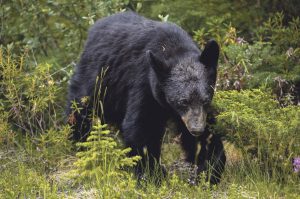BY PAUL HUGHES
REPUBLICAN-AMERICAN
HARTFORD — A bird feeder exemption broke a legislative stalemate on easing rules for farmers to get state permits to hunt bears that damage crops, livestock and beehives.
The state Senate on May 11 removed a problematic prohibition on the unintentional feeding of bears and other nuisance wildlife that the bill’s supporters had said was the last obstacle to overcome.
Senators also added clarifying language that potentially dangerous animals do not include domestic dogs and cats, or animals in zoos or wildlife facilities
After the changes, the Senate voted 31-3 to expand eligibility for state permits for taking bears and other nuisance wildlife that threaten or cause damage to agricultural crops, livestock, or apiaries for bees.
The bill also allows a person to use deadly physical force to kill a bear to defend their persons, other people and pets, or stop a bear from entering a building occupied with people.
Legislators have been wrestling with how to respond to the exploding black bear population and rising number of bear encounters in Connecticut.
State wildlife officials reported nearly 70 home entries by bears in Connecticut in 2022. Bears also damaged more than two dozen motor vehicles.
The Environment Committee rejected a bill last year that proposed to ease restrictions on property owners obtaining nuisance wildlife permits to hunt down bears under the circumstances set out in the 2023 version of the legislation.
Since then, a 10-year-old was mauled by a bear playing in the backyard of his grandparents’ home last October, and, more recently, a 74-year-old woman was bitten by a bear in April while walking her dog in Avon. In both cases, state conservation officers euthanized the two bears.
After the Senate vote, Sen. Stephen Harding, R-Brookfield, said he believed those two troubling incidents and other bear encounters in the past year changed minds and votes. His district includes Morris.
“It has gotten very dangerous, and I think people realize that we have to do something before something happens that could be more tragic,” Harding said.
Under Senate Bill 1145, a property owner must show the Department of Energy and Environmental Protection attempts to use nonlethal means of protecting the property failed to prevent damage. Examples include electric fencing, animal guardians, or fortified structures. A property owner must also demonstrate taking of wildlife is necessary to protect the property from excessive.
The legislation states that DEEP must specify in the permit to a property owner or a lessee who has owner’s written permission the means, methods, and times for when taking wildlife is allowed. State wildlife officials also get to determine how property owners dispose of the wildlife.
The bill also prohibits people from intentionally feeding a potentially dangerous animal on private land. Violations are infractions punishable by fines between $35 and $90, plus additional court costs.
The Senate removed a similiar prohibition on unintentional feeding of problem wildlife that would have applied to property owners who hang birdfeeders, feed animals outdoors, or leave trash accessible.
Harding said the bill is a compromise between legislators like himself who support bear hunting and colleagues opposed to hunting of bears.
“I think that a regulated hunting season is a logical approach to addressing this issue. The experts at DEEP testified to that,” he said. “That is not in this bill in deference to the fact politically that individuals would not allow it.”













